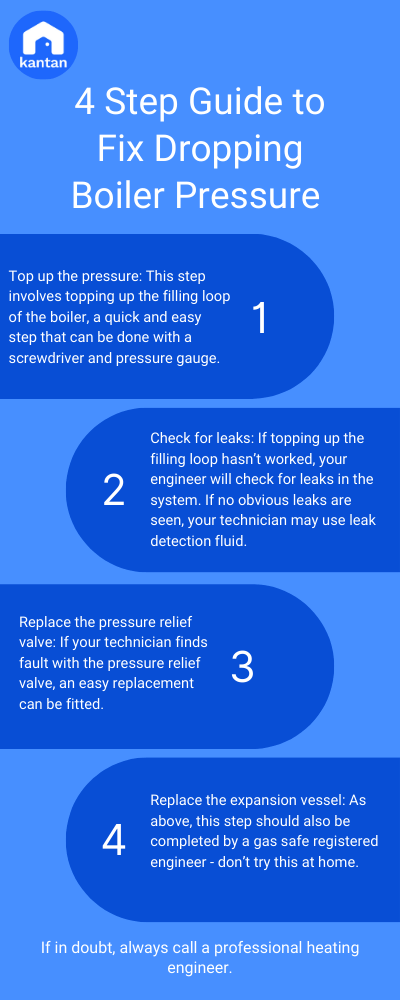Boiler Pressure - Why it Keeps Dropping and How to Fix It
My boiler pressure keeps dropping, how can I fix it?
Not sure why your boiler pressure keeps dropping? In this guide, you’ll find out the common causes for low boiler pressure, how to diagnose potential faults in the system, a 4-step guide to fixing these faults, and when you should be calling in a professional gas safe engineer to help.
Introduction: Understanding Boiler Pressure and Why It Matters
Boiler pressure is one of the important aspects of your heating system, and it refers to the amount of pressure that the water in your heating system is under. The pressure in your boiler directly affects both the performance and efficiency of your heating system. When boiler pressure is too low, you will experience poor heating, low hot water pressure, or even complete system failure. Issues can also arise if boiler pressure is too high, as it may cause leaks and damage to elements of the boiler system.
Diagnosing the Cause of Low Boiler Pressure
Diagnosing the cause of low boiler pressure is a problem solving exercise. Commonly, the cause of low boiler pressure can be put down to either a leak in the system, an issue with the pressure relief valve, filling loop, or a problem with the expansion vessel.
It’s important to examine your system and correctly identify the specific cause of low pressure, which is when many contact a registered professional heating engineer who will help fix the problem, which could be as simple as topping up the pressure using the filling loop.
A 4 Step Guide to Fixing a Dropping Boiler Pressure
Once the problem has been identified, the gas safe engineer will often follow one of these 4 steps to get your boiler pressure back up to optimal levels.
Top up the pressure:
This step involves topping up the filling loop of the boiler, a quick and easy step that can be done with a screwdriver and pressure gauge
Check for leaks:
If topping up the filling loop hasn’t worked, your engineer will check for leaks in the system (if they were not obvious at first look). If no obvious leaks are seen, your technician may use leak detection fluid
Replace the pressure relief valve:
If your technician finds fault with the pressure relief valve, an easy replacement can be fitted (this step should be completed by a professional to avoid any further potential damage to your boiler)
Replace the expansion vessel:
As above, this step should also be completed by a gas safe registered engineer - don’t try this at home
If these 4 steps are completed with no luck, your engineer should be able to advise you on the next best option to restore boiler pressure.
A 4 step guide to fix dropping Boiler Pressure
How to keep your Boiler Pressure Stable
Keeping your boiler pressure stable is the best course of action to avoid the need for any repairs or fixes. Here’s what we would recommend to keep your boiler pressure from dropping or being too high:
Regularly check your boiler pressure:
Top up the pressure as needed:
If the pressure drops, top it up using the filling loop. This is a simple process that can be done using a screwdriver and a pressure gauge. If unsure how, please contact a professional
Bleed the radiators regularly:
Bleeding the radiators on a regular basis can help to keep the pressure stable by removing any air from the system. This will reduce the pressure and any strange noises coming from your boiler system
Keep the boiler system well maintained:
Making sure you get an annual boiler service will keep your system in good working order and prevent issues such as low pressure
When to call a professional for boiler pressure issues
For the vast majority, it’s better to rely on the professionals to fix any boiler issues. Here’s 4 instances when we’d suggest you should get professional help:
Complex repairs:
If the cause of the low pressure is a complex issue, such as a damaged expansion vessel, it is best to call a professional. They will have the expertise and tools to diagnose and repair the problem
Safety concerns:
If you have concerns about the safety of your heating system, such as a gas leak, it is important to call a professional immediately. They will be able to assess the situation and take the necessary steps to ensure the safety of your home.
Lack of experience:
If it’s the first time you’re attempting to fix a boiler fault, or diagnose an issue, it’s best to call a professional.
Warranty issues:
If your boiler is under warranty, or you have cover, it’s best to call in an engineer to make sure that your warranty remains valid
Calling in a professional ensures the problem is correctly diagnosed and fixed on the day, with no further damage to your system.
If interested in a boiler service, or in need of an urgent repair, Kantan is happy to help.

